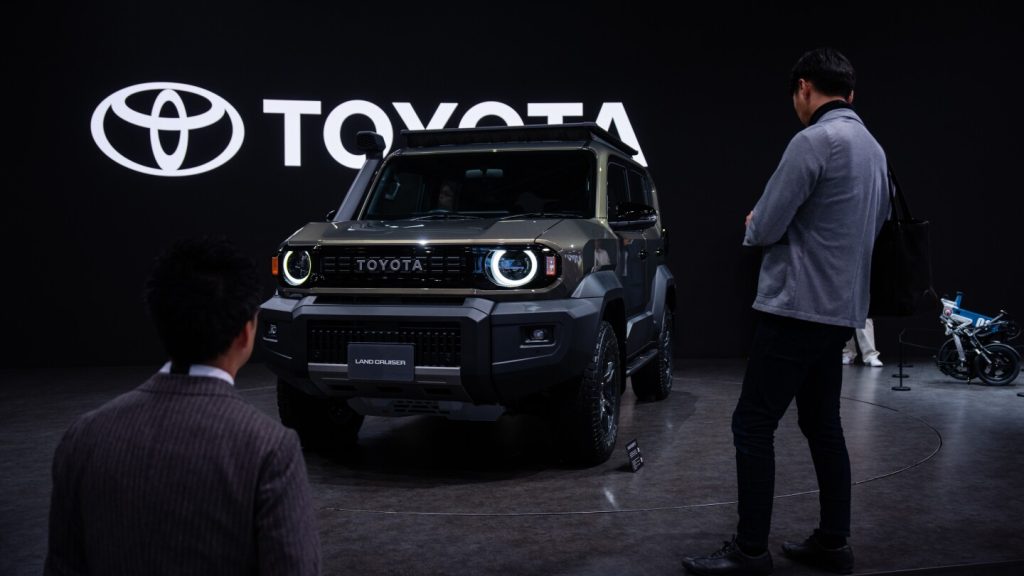Listen to the article
Toyota Reports Profit Drop as Trump Tariffs Hit Japanese Automakers
Toyota Motor Corp. reported a 7% year-on-year decline in profit for the April-September period on Wednesday, as higher U.S. tariffs imposed under President Donald Trump’s administration continue to impact Japanese automakers.
The world’s largest automaker by volume saw its net profit fall to 1.77 trillion yen ($11.5 billion) in the first half of its fiscal year, down from 1.9 trillion yen during the same period last year. The results reflect growing challenges facing Japanese manufacturers in one of their most important export markets.
Despite the setback, Toyota raised its full-year profit forecast for the fiscal year ending in March 2025 to 2.93 trillion yen ($19 billion), up from its previous projection of 2.66 trillion yen ($17 billion). The company attributed the improved outlook to stronger vehicle sales, a better product mix, and ongoing cost-cutting initiatives.
Even with the upgraded forecast, Toyota still expects its annual profit to fall 38.5% from the 4.77 trillion yen it reported for the previous fiscal year, highlighting the significant impact of the trade tensions.
The tariff situation has evolved since Trump initially imposed a steep 27.5% duty on Japanese automobiles and auto parts. While this rate was subsequently reduced to 15% in September, it remains substantially higher than the original 2.5% tariff that had long been in place, creating a challenging business environment for Japanese automakers.
“Despite the impact of U.S. tariffs, we have continued to build upon our improvement efforts such as increasing sales volume, improving costs and expanding value chain profits,” Toyota said in its statement, emphasizing its resilience in the face of trade headwinds.
The company’s strategic adjustments appear to be bearing fruit. Toyota expects these efforts to add more than 900 billion yen ($5.8 billion) to its bottom line this fiscal year, helping to partially offset the tariff impact.
Toyota’s sales performance has remained strong in key markets despite the challenges. During the six-month period through September, the company sold more than 1.5 million vehicles in North America and 970,000 vehicles in Japan. Overall sales grew 5.8% to 24.6 trillion yen ($160 billion) for the first half.
For the most recent quarter ending in September, Toyota reported more positive figures with a 62% rise in profit to 932 billion yen ($6 billion) on sales of 12.38 trillion yen ($80 billion), representing an 8% year-on-year increase.
The tariff situation has affected the broader Japanese auto industry, with exports to the United States declining significantly in recent months. This trade tension comes at a challenging time for the global automotive sector, which is already navigating supply chain disruptions, rising material costs, and the expensive transition to electric vehicles.
Toyota, known for its Camry sedans and Lexus luxury vehicles, has maintained its production flexibility and global manufacturing footprint, which may help it weather these trade challenges better than some competitors. The company’s hybrid vehicle leadership also provides some insulation from market volatility, as these vehicles continue to see strong demand globally.
Industry analysts note that Japanese automakers may need to accelerate plans for U.S. production expansion if the higher tariffs remain in place long-term. Toyota already manufactures many vehicles in North America, but the company might need to reassess its supply chain and production allocation strategies to minimize tariff exposure.
The automotive trade tensions between the U.S. and Japan represent one aspect of broader global trade realignments that are reshaping manufacturing and supply chain decisions throughout the industry.
Fact Checker
Verify the accuracy of this article using The Disinformation Commission analysis and real-time sources.




7 Comments
The 38.5% drop in Toyota’s annual profit from the previous year really underscores just how substantial the tariff impacts have been on their business. It’s a challenging environment for all Japanese automakers right now.
I wonder how long Toyota and other Japanese automakers can sustain these kinds of profit declines before the tariffs start to really threaten their viability in the U.S. market. The trade tensions seem far from resolved.
You raise a good point. The long-term viability of Japanese automakers in the U.S. under these tariffs is a real concern. Continued cost-cutting and adaptation will be crucial for them.
It’s a shame to see Toyota’s profits impacted by the U.S. tariffs, especially since they’ve been such a dominant player in the global auto market. Hopefully the trade situation can be resolved amicably.
The trade tensions with the U.S. under Trump’s tariffs continue to hit Japanese automakers hard. Toyota’s profit drop highlights the challenges they face in a key export market.
It’s interesting to see Toyota still able to raise its full-year profit forecast despite the significant headwinds. Their cost-cutting efforts and product mix improvements seem to be helping offset some of the tariff impacts.
Toyota’s ability to adapt and improve its outlook in the face of trade uncertainty is impressive. Their resilience will be crucial as the tariff situation continues to evolve.